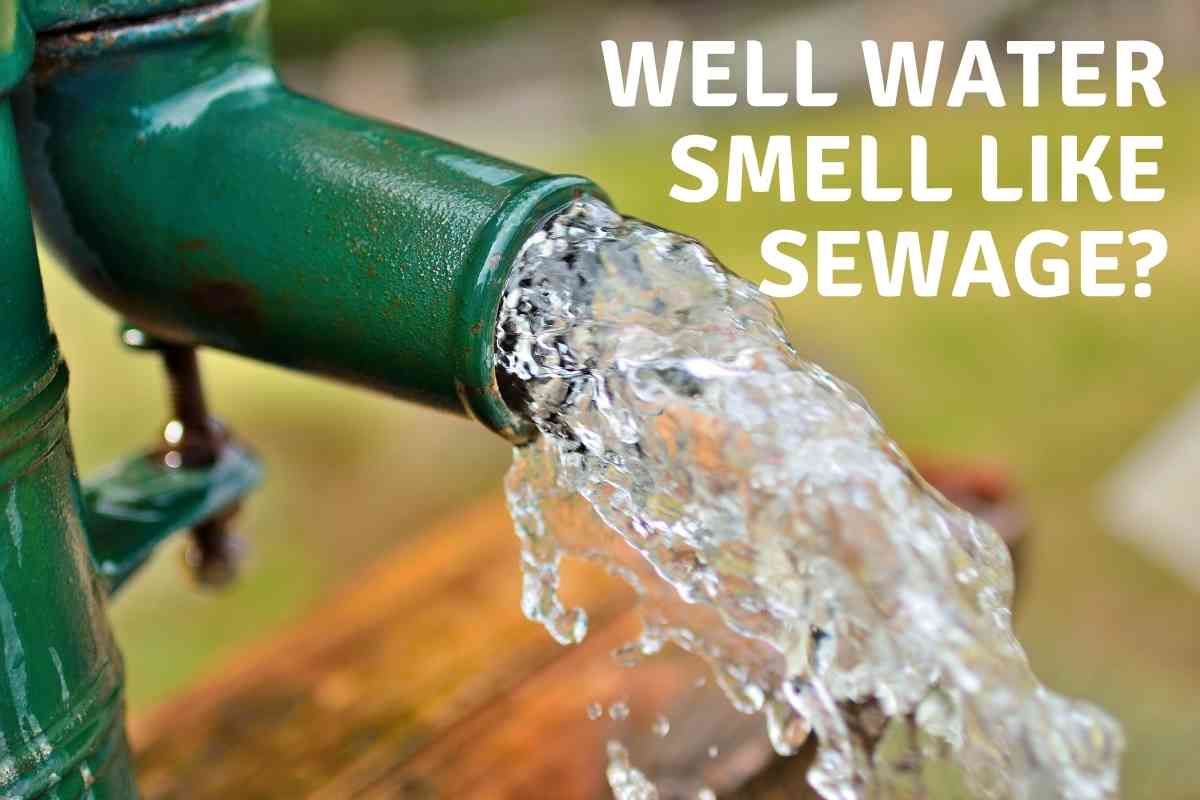Well Water Smell Like Sewage? How To Fix In Minutes!
Well water should smell fresh and clean. When well water takes on an unusual odor, you should start taking steps to fix it.
Understanding why your well water smells like sewage is the first step in being able to fix it. Thankfully, most homes can get rid of that gross smell relatively quickly with a little know-how.

Why does my well water smell like sewage and how to I fix it?
A sewage or sulfur smell in well water is often caused by bacteria. The bacteria remain harmless unless in high concentrations – which you’ll notice anyway, and can be filtered. One of the best ways to remove the smell is using chlorine in your well.
We’ll walk you through how to determine the source of the smell. Once you figure out the source, we’ll also tell you how to fix it in detail.
We’ve done home improvement projects and have some experience fixing wells that smell like sewage. We’ll be focusing on sources that know a thing or two about well odor issues that can help you fix the problem.
Finding the source of the smell
It’s easy to mistake the source of a bad smell in your water supply. Well water and municipal, or city water, can also acquire an unusual smell sometimes. Even your hot water heater or water softener can cause odors.
There are a couple of easy ways to determine the true source of your water problems.
Turn on the cold water first
Try running cold water first. This water does not go through your hot water heater, so it can easily eliminate the hot water heater as the culprit for strange smells.
If the cold water smells like sulfur or sewage, you may have eliminated a link to the problem.
Turn on the hot water
Next turn on just the hot water. If your cold water didn’t smell, but your hot water does, you have at least found the source of your problem.
With this said, if only your hot water smells, the problem isn’t your well. If the problem is likely because of the type of rod used in your hot water heater as an anti-corrosive device. This is easily fixed!
Try non-water softened faucets
Most households connect some faucets, like any exterior spigots, directly to the water supply without the water softener. If these faucets do not have the same smell, the problem could readily be your water softener instead.
Recent additions
Did you recently add a whole house filter or any kind of filtration system? These can cause odors at first as they eliminate contagions.

Why does my water smell?
The problem is most commonly hydrogen sulfide. Hydrogen sulfide is a gas that could be present in your well. Of note, hydrogel sulfite is poisonous and flammable – but only in higher concentrations that are readily detectable in smell.
Smelling it now is a sign that the amount is building, and should be taken care of soon.
The presence of hydrogen sulfide is also an indicator that other bacteria can grow, including iron bacteria. The slime from these types of bacteria can clog the septic system and plumbing.
How do I fix the smell?
Part of the answer depends on how bad the problem has become. You might want to start by using a strong, commercial chlorine solution to clean out your well.
For the purpose of safety, it’s advisable that you either have a professional approach your well if it’s in a pit, or you use a ventilation mask to prevent problems when near well gas.
Locating and opening your well
Some modern wells have a rather obvious vertical pipe head sticking out of the ground that accesses your well. These are easy for the average homeowner to get to.
While they can be a little different, some steel wellheads are secured by just bolts. Brining an adjustable wrench or a bolt driver with you should make taking them off easy.
The next step is to remove the cover, which should be easy once the bolts are removed.
Getting chlorine into the well
Chlorine tablets are readily available at many retail stores. You can also use bottled chlorine. In the case of chlorine tablets, read the instructions to see how many you should use.
When dumping the tablets in, be sure they get into the water. Use a flashlight if needed to make sure the chlorine doesn’t fall onto an adapter, as chlorine is corrosive and can damage the adapter.
Pour some water from a hose in to ensure that the chlorine gets well mixed and pushed into the water.
You should then pump the well out until the smell of chlorine is gone. The idea is to remove the chlorine present along with the remaining hydrogen sulfide.
To take it a step further, you might also want to scrub the casing of your well, all while using stronger anti-bacterial solutions. A licensed well contractor is probably the best solution to take care of this step.
You’ll also want to use shock chlorination treatment with the drains of your home. The gas can remain trapped in drains, and the smell can be provoked by the presence of water in the drain.
This is as easy as putting the solution in the drain, then running water for a few minutes.
More steps to take with chlorine
Chlorine does a good job of loosening debris that might come into your house in the end. One step to take to prevent clogs within your faucet is to remove aerators and clean them, especially if water flow gets slow.
Screens within your washing machine or other waster using devices should also be checked.
How long will this take?
If you are prepared, it shouldn’t take more than a few minutes to open the well cover and drop chlorine in. You might spend a little more time passively pumping well water until the smell is gone, and a little time inside checking aerators once the water is flowing.
Will I need more than one treatment?
You might need to chlorinate your water more often. If the smell of sewage or sulfur comes back, it’s a sign that bacterial growth is still happening.
You might want to consult with your city or a water service professional about getting the well more thoroughly cleaned, installing a constant filtration system, or re-doing the well to avoid contaminant sources.
It’s possible that the well is being contaminated by its own water source that you don’t necessarily have access to. The city is most likely in charge of this source and needs to know about an ongoing problem.
Temporary Solutions
If the amount of hydrogen sulfide in your water tests is relatively low at less than one milligram per limit, there are things you can do within your home to get rid of the smell – at least within the drinking water.
Home water filtration can make all your water taste and smell better. It’s entirely possible to install a home water filtration system where your water comes into the house. These come with filters that need to be replaced, but they can be easy to use.
Combining a home water filtration system with well maintenance can ensure proper water smell for a long time.
You could also use a more simple home water system that includes bacterial filtering.
These tend to be a little more expensive than a typical water filter system that simply reduces minerals, but well worth it to keep drinking water readily available in your home if your well has repeated problems.
Why does it smell specifically like sulfur or sewage?
Water can sit in a well for a very long time – it’s likely been sitting there for thousands of years before people found it. With septic systems, ground run off from cars, and a huge variety of other sources, substances can accidentally leak into a well.
In some cases, bacteria can be naturally occurring.
Most any water or oxygen source that has been sitting for a long time without agitation will smell a bit old, at least.
Have you ever opened your car door in the heat when there was something sitting inside? It might smell like any food you left in there.
The sewage or sulfur smell is potentially literally some of the content in the well, built up over time, and sent through the water.
Getting your well tested
On a side note, it’s worth getting your well tested at least once per year anyway. The conditions underground can change quickly and result in other, new contaminants getting into your water besides bacteria.
Some are not easily noticeable, either.
Get it tested for lead, mercury, bacteria, and other potentially harmful elements. You can be ready to fight off potential problems with your water supply with a home filtration system, too.
One of the advantages to having well water is not relying on the city, but many cities do a good job of filtering their water of harmful substances.
What if I can’t fix the smell?
Your best bet is to call a water service professional, or your city. You likely share a water source with more than one neighbor, so the city might be quite interested in knowing where contaminants are coming from.
They may not be willing to pay to help fix it, but they can help communicate issues to others and have knowledge and guidance for you.






